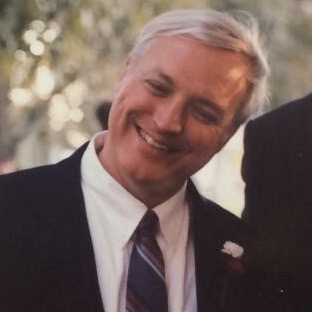News
- grace and peace to you also. grace and peace was spoken in all or nearly all chapters/books so we know it is by grace we are enabled and never go under the law of performance/perfectionism which I suffered under for many, many years. I AM crucified with Christ. I suffered under the law: guilt, condemnation, shame for nearly all my Christian walk until about a year ago where I have been enlightened to His grace and love IN my imperfection. It is so easy to go back under the law to perfect ourselves or to feel guilt about our imperfections. It is never the Lord who is doing this. We can't crucify the flesh. It is a walk of grace and grace alone and His work in us that does this. It is all by faith for sure. Holiness without understanding the correct balance leads to legalism which I can see so much more clearly now. Sorry to ramble, but I am sure you understand this.

William Trudeau — Edited
Giving voice to the truth of God's amazing grace and your deeper discovery of its necessity in the pursuit of holiness is certainly not rambling! 🤗 Here is a quote from my notes I think you will find tuned to your own heart. Paul has just declared that the whole world has sinned and stands guilty before God (Romans 3:19). The fact of guilt raises the problem of justification. How can sinners be justified, or brought back into a right relationship with God and his law? Can a person work himself back into a proper relation with this law? Perhaps with a little extra effort, we can go “above and beyond the call of duty” and do enough good works to make up for our sins. Is this possible? No! In the parable of the unprofitable servant (Luke 17:7–10) Jesus teaches that every good work we can possibly do is already owed to God (required by his law) and therefore cannot be used to pay the debt incurred by our sin. There is no such thing as extra merit; this is why works of law cannot justify sinners. What, then, can we do? How can we be justified, be counted righteous, be accepted by God, escape the wrath and condemnation we deserve? Does any provision of the law allow a sinner to go unpunished? Can we remain under law and still be justified? No! If we are to be justified, we must leave the framework of law and enter the sphere of grace. This subsection of Romans shows us what this means by explaining that sinners can be justified by the blood of Jesus Christ through their faith in him. We can be justified only by faith apart from works of law (Romans 3:28). In establishing this point the Apostle Paul produces what Morris declares to be “possibly the most important single paragraph ever written” (173). He is referring to Romans 3:21–26. This is, indeed, the “center and heart” of the letter, as Cranfield says (I:199). In one compact manifesto Paul brings together the heavy theological concepts of the righteousness of God, faith, sin, justification, grace, redemption, propitiation, and the blood of Christ. By emphasizing the righteousness of God and faith, he elaborates on Romans 1:17, the key verse in the epistle’s introduction. [1] Cottrell, J. (1996). Romans (Vol. 1, Ro 3:21–31). College Press Pub. Co.- Thank you, Brother William, for this response. I like what you shared. Romans 6 and its passage of "Should we continue in sin that grace may abound; God forbid" is similar to your statement about leaving the "framework of law and enter the sphere of grace." My identity is now in Christ's righteousness and I am bound to that and I have left the bounds of the law (dead to sin and the law). People do misuse the scripture in Romans 6 to mean "you better stop sinning" and that is not what it is saying. Anyways, if one lives in condemnation and sin-consciousness one is looking to fulfill the law by his own works because he feels separated from God's love and that was me so much of the time. I seriously lived this way for years. I think so many do in fact due to a wrong understanding of holiness, love and grace, justification and sanctification. It can move one to condemnation or self-righteousness. God's grace moves us to the fruit of the Spirit by faith. I love this. I feel so much more free. Thanks for listening.
 Socrates
SocratesWho is Your Saviour? - Socrates or Jesus?
Salvation is never found as one journeys within. There is no light at the end of that tunnel. Self-knowledge is critical, but the discovery of “me” can only yield despair. If you claim (as many do) to have “found yourself” - the “true you” – without also finding despair, you have found nothing but self-deception. The revelation of “me” to “me” is always known by the horror that haunts the illumination. If you have not experienced the horror, you have not found yourself.
One may claim to know oneself better than one is known by the outsider – the other. One may fancy an inner perception of oneself that involves a noble mystery unrecognized by most or all. But if the narrative one tells oneself about oneself is absent the horror that necessarily accompanies human self-discovery, such a one has no more set his foot upon the truth of “me” than he has set a foot on Mars.
The Socratic method of Recollection emerges from the milieu that spawned the Apollinarian inscription at Delphi: γνῶθι σεαυτόν - Know Thyself. The modern idea that Salvation can be obtained through education and self-discovery is founded upon this Greek ideal. This idea is not classic Hebrew psychology. It is not Christian soteriology. It is not Biblical, so it is not true.
Recollection, or some form of reacquaintance with the forms of morality, will absolutely bring truth to the soul, but it will not bring Salvation. It can produce despair, but it cannot bring release. Finding “self” by yourself (a journey within) is as useless as seeing a loved one with all clarity when that loved one is trapped in a fire you cannot penetrate. In that case, having eyes to see can only bring despair, for one lacks the equipment to extract the loved one from destruction.
Salvation must come from without. To the Realization of one's self must be brought the Revelation of the Other - of Jesus, the Savior from without – the Absolute Outsider – the One who is precisely not you. The One who knows you better than you know yourself and knows the fire you are trapped in - the One who alone has the equipment to enter in, extract and save.
God never prescribes taking the inner journey on your own, apart from the gracious Guide –Jesus our High Priest - the Absolute Outsider who took on flesh.
The time will come when God leaves a soul to the experience of self-discovery without the offer of His aid. This is known as Hell, and Hell is eternal despair in knowing the truth of “me”. To take the trip inside now without the help of Jesus (if executed effectively), is to face hell too soon, for the Saviour is yet saying, “Cast your burdens upon me,” and what weighs more than the weight of “me”?
So, let the mouths of every happy explorer of the inner life be stopped, and let all the silly songs fall silent. Let all the world be guilty before God (Rom 3:19). Then we can claim to have found the true path of inner knowledge; the narrow way that leads to Life. Then we can compose hymns of praise that make sense, when self is left out of the score.
Let every man who looks within confess the truth: “Within me (that is, in my flesh – that is, “me” on my own and apart from Christ) dwells no good thing” (Rom 7:18).
Let every man leave the hope of education and flee to the refuge of Revelation, taking hold of the Hand that stretches from Heaven to save them who dwell on Earth.
Let every man who journeys within seek Salvation from without.
Jesus made His mission clear: The Son of Man is come to seek and save that which is lost (Luke 19:10). God sent the Absolute Other so that we can find His Salvation when we finally find ourselves.
- Actually, referring to the god Apollo was one of the definitions, it may even have been the first one. But there were several other definitions, so I wasn’t sure which one you were referring to. Since your post refers to Delphi, I think your usage is pretty clear. Would you consider elaborating a little bit on the connection between the Greek god Apollo and the saying, “know thyself”? Unless that is not of any real importance… Thank you, dear Brother!
- Apollo (actually non-existent) was the Greek god of the oracle for he was the god of artistic knowledge and education. That combination (art and pedagogy) seems to mix together into an oracular or prophetic emphasis. Hence, Apollo was the patron God of the temple in Delphi over the entrance of which was inscribed, "γνῶθι σεαυτόν" or Know Thyself. That concept became a central tenant of Plato's Socrates (and likely the historic Socrates as well - Socrates, like Jesus, left no writings of his own). Socrates speaks much of the need to examine the assumptions of both the external and internal aspects of life. Socrates can probe with searching questions, but he cannot provide eternal Answers. Indeed, Socrates and his method argues for "aporia" -- the idea that questions can and should be raised which weaken the sense of certainty that is found in conventional wisdom, but the "truth" lies in realizing that there are no fixed answers. There is no "path" that reaches objective, eternal truth. "Aporia" = no passage, no way to the truth.
- Thank you! Helps me in understanding a lot of the thinking in the world around me, as well as influences in the educational system. PTL
 The New Jeweled Cross
The New Jeweled CrossThe Old Cross and the New
The new cross does not slay the sinner, it redirects him. It gears him into a cleaner and jollier way of living and saves his self-respect. To the self-assertive it says, “Come and assert yourself for Christ.” To the egotist it says, “Come and do your boasting in the Lord.” To the thrill-seeker it says, “Come and enjoy the thrill of Christian fellowship.” The Christian message is slanted in the direction of the current vogue in order to make it acceptable to the public.
The Old Rugged Cross
The old cross is a symbol of death. It stands for the abrupt, violent end of a human being. The man in Roman times who took up his cross and started down the road had already said good-by to his friends. He was not coming back. He was going out to have it ended. The cross made no compromise, modified nothing, spared nothing; it slew all of the man, completely and for good. It did not try to keep on good terms with its victim. It struck cruel and hard, and when it had finished its work, the man was no more.
That evangelism which draws friendly parallels between the ways of God and the ways of men is false to the Bible and cruel to the souls of its hearers. The faith of Christ does not parallel the world, it intersects it. In coming to Christ we do not bring our old life up onto a higher plane; we leave it at the cross. The corn of wheat must fall into the ground and die.
God offers life, but not an improved old life. The life He offers is life out of death. It stands always on the far side of the cross. Whoever would possess it must pass under the rod. He must repudiate himself and concur in God’s just sentence against him.
What does this mean to the individual, the condemned man who would find life in Christ Jesus? How can this theology be translated into life? Simply, he must repent and believe. He must forsake his sins and then go on to forsake himself. Let him cover nothing, defend nothing, excuse nothing. Let him not seek to make terms with God, but let him bow his head before the stroke of God’s stern displeasure and acknowledge himself worthy to die.
Having done this let him gaze with simple trust upon the risen Saviour, and from Him will come life and rebirth and cleansing and power. The cross that ended the earthly life of Jesus now puts an end to the sinner; and the power that raised Christ from the dead now raises him to a new life along with Christ.
Tozer, A. W. (2007). The Best of A.W. Tozer Book One (p. 178). WingSpread.
- Thank you, Br. William. These truths are so important to remember. And it is important to keep a clear distinction between the "new cross" and the "old cross," as there is so much mixture out there. Thank you for posting this article, which is helpful to me in its clear clarifications and exhortations.
- Tozer is a real gift to God's family. I don't agree to the "T" with everything my dear brother held, but Tozer's writings have helped me again and again.
 It is Appointed Unto Man Once to Die - Hebrews 9:27
It is Appointed Unto Man Once to Die - Hebrews 9:27Holiness in Death
Follow peace with all men,
and holiness,
without which no man shall see the Lord:
Hebrews 12:14
Death is a lurking devourer never satisfied which most men would be wise to fear (Hebrews 2:14-15; Prov 30:15-16). Thy soul is required in an hour unknown (Luke 12:20).
The grave is conquered by the risen Victor, Jesus Christ, Who broke the bonds of sin and death bringing life and immortality to life by the Gospel (1 John 3:8; 2 Timothy 1:9-10; 1 Corinthians 15:54,55).
Holiness is the sure way to eternal life without which no man shall pass the parted veil into joyous life in the presence of God. The unknown hour wherein the wick is extinguished is made a secure passage when holiness lights the soul (Hebrews 12:14; Matthew 6:22).
With these thoughts, I encourage you to mediate on the following words from the Scottish minister and biographer of R. M. M'Cheyne, and Evan Hopkins - Alexander Smellie (1857-1923)
I REMIND MY SOUL
Setting forward on my pilgrim march through the year, I remind my soul.... Without holiness no man shall see the Lord....They who stay with God, either here or hereafter, must sympathize with His aims, must share His likeness, and must be set on fire with His passion for truth and hatred of sin. Else, what community of interest can there be between Him and them? what fellowship of a friendly sort? So let me be certain that my sanctification deepens and increases with every day of the year. It will be a gradual process, a slow and patient ascent. But there will be no doubt of its ending, if I keep steadfast company with Christ. I have only to live habitually in His light, and the light will shine more and more. And one happy morning, in the nearer or farther future, I shall find myself— myself who am so unworthy and so unclean—perfect even as my Father in heaven is perfect. — Alexander Smellie (1857-1923) In the Secret Place - London - Andrew Melrose 16 Pilgrim Street (1907) p. 2
- Thank you! Very edifying, encouraging and sobering. I especially liked the line: “I have only to live habitually in His light, and the light will shine more and more.” As Prov. 4:18, PTL. I hope to read the remaining scripture references and comments later on. Blessings to all!

William Trudeau — Edited
Dear Sister Leslie, You are not allowed to do your housework until you have read everything at Faithlife. Haven't you read our rules for membership?! 😂- Hahaha! 😁 Good thing I am learning to balance “one thing is needful “with “seest thou a man diligent in his business? He shall stand before kings…” However as I am still out walking I have begun to read the comments, anyway! PTL 🙏😊




Drawing Nigh Unto Perfection
The Call
Fundamentally, the local Ekklesia is a gathering of Born Again Brethren who now have ears to hear the Father's call to Communion with Himself - the one Triune God. (John 17:3; Matthew 16:18; John 10:27; Revelation 22:17)
They who can hear, assemble with one heart and one mind in one place in the interest of responding to God's call toward perfection. (Acts 4:32; Philippians 2:2; 1 Peter 3:8)
Their drawing nigh to God is preceded by His call to come, much as their love for God is preceded by His love for them. (1 John 4:19) If the Shepherd did not call first, none would come. There would be no flock, no true Church.
This call and response forms the basis of the communal relationship which Christ gave His life to establish between Himself and His Bride, the Church.
Consider the Following Passages
Draw nigh to God, and he will draw nigh to you. (James 4:8)
Then shall we know, if we follow on to know the LORD: His going forth is prepared as the morning; And he shall come unto us as the rain, As the latter and former rain unto the earth. (Hosea 6:3)
Jesus answered and said unto him, If a man love me, he will keep my words: and my Father will love him, and we will come unto him, and make our abode with him. (John 14:23)
Abide in me, and I in you. As the branch cannot bear fruit of itself, except it abide in the vine; no more can ye, except ye abide in me. (John 15:4)
Behold, I stand at the door, and knock: if any man hear my voice, and open the door, I will come in to him, and will sup with him, and he with me. (Revelation 3:20)
I sleep, but my heart waketh: It is the voice of my beloved that knocketh, saying, Open to me, my sister, my love, my dove, my undefiled: For my head is filled with dew, And my locks with the drops of the night. (Song of Solomon 5:2)
Draw me, we will run after thee: (Song of Solomon 1:4)
Thou that dwellest in the gardens, The companions hearken to thy voice: Cause me to hear it. 14 Make haste, my beloved, And be thou like to a roe or to a young hart Upon the mountains of spices. (Song of Solomon 8:13–14)
Gathering Unto Perfection Himself
The call to gather is a call toward perfection for He who calls is absolutely Perfect and He calls us unto Himself. Be ye therefore perfect, even as your Father which is in heaven is perfect. (Matthew 5:48)
But drawing nigh to Perfection is necessarily a life-long journey for perfection cannot be reached in three easy steps.
It is not compromise or weak heartedness to point out that an all-too-ready zeal which easily claims, as did Israel at the foot of Sinai, "All the words which the Lord has said will we do" is more in the direction of self-confidence than it is an evidence of true piety.
Gathering with reverence and godly fear (Hebrews 12:28) involves gathering with a realistic sense of how high the calling is and how continuously we must press forward through difficulty if we would apprehend that for which God is apprehending us.
Taking up the cross involves a realistic counting of the cost. (Luke 14:28)
It is not taking on too much at once, but a patient continuance in well doing that reaches glory, honour, immortality, and eternal life. (Romans 2:7)
It is not force feeding meat, but a steady growth from babe to glory that brings us to genuine Christ likeness. (1 Corinthians 3:2; 1 Peter 2:2; 2 Corinthians 3:18;
Ephesians 4:11-13)
Indeed, it does not help our long-term growth when we think more highly of ourselves than we ought to think: boasting of our attainments and certain that we will conquer the last incline to perfection in a week (Romans 12:3; Luke 18:9-14). For it is not of him that wills and runs and talks, but it is of God who shows mercy. (Romans 9:16; James 1:26)
Recall that Paul himself said, "Not as though I had already attained, either were already perfect…Brethren, I count not myself to have apprehended". (Philippians 3:12-14)
It is good for us to be humble in the sight of God's absolute perfection rather than attempt a sprint to the peak only to fall back in exhaustion before we reach the first level of real and lasting change. (Hebrews 12:1; Ecclesiastes 7:16)
It is good for us to steadily add line to line, here a little and there a little, rather than bite off paragraphs at a time that go down sweet with vain confidence, but become bitter in our belly when we find it hard to digest a meal too quickly devoured. (Revelation 10:10)
By all means, pursue holiness, but pursue peace too, for without the one or the other no man shall see the Lord. (Hebrews 12:14; Romans 5:1)
And as you do, consider the following sound advice from godly Robert Leighton lest your zeal for the top lands you flat on your face.
Robert Leighton's Counsel
Robert Leighton (1611-1684)
Put all your trust in the special and singular mercy of God, that He for His mercy's sake, and of His only goodness, will help to bring you to perfection. Not that absolute perfection is attainable here; but the meaning is, to high degrees of that spiritual and divine life which is always growing and tending towards the absolute perfection above; but in some persons comes nearer to that and rises higher, even here, than in the most. If you with hearty and fervent desires do continually wish and long for it, and with most humble devotion daily pray unto God, and call for it, and with all diligence do busily labour and travail to come to it, UNDOUBTEDLY IT SHALL BE GIVEN YOU. ... [emphasis added]
Though at first you feel no sweetness in such exercises, yet be not discouraged, nor induced to leave them [i.e., don't quit], but continue in them faithfully, whatsoever pain or spiritual trouble you feel; for, doing them for God and His honour, and finding none other present fruit [i.e., not detecting amazing results thus far], yet you shall have an excellent reward for your diligent labour and your pure intentions. And let not your falling short of these models and rules, nor your daily manifold imperfections and faults, dishearten you; but continue steadfast in your desires, purposes, and endeavors; and ever ask the best, aim at the best, and hope the best, being sorry that you can do no better; and they shall be a most acceptable sacrifice in the sight of God, and in due time you shall reap if you faint not. And of all such instructions let your rule be, to follow them as much as you can; but not too scrupulously thinking your labor lost if you do not exactly and strictly answer them in everything. Purpose still better, and by God's grace all shall be well.
The Whole Works of Robert Leighton, D.D., Archbishop of Glasgow, to Which is Prefixed A Life of the Author by John Norman Pearson, M.A. [1846] (pp. 732-733)